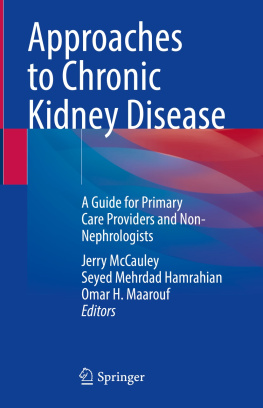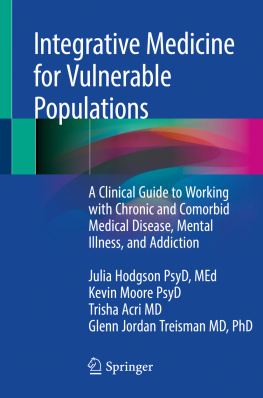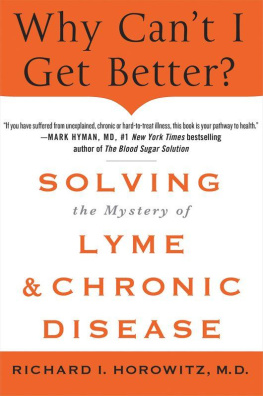
Contested Illness in Context
What makes a disease real? Why is it that patients with chronic fatigue syndrome or fibromyalgia are doubted when they say they are in pain, and cannot access the same benefits of patient-hood that others can? What defines the limits of our belief and, ultimately, compassion, when it comes to disease?
These are the questions approached in this book, which draws upon patients experiences and situates them among a diverse set of literatures, from the history and philosophy of medicine to the sociology of health and disease. The question of a patients identity and their understanding of disease is often assumed to emerge from their relationship with healthcare, but the case is made here that other, inter-personal factors are more salient. What a patient with a contested illness comes up against is not simply a medical categorisation it is a prevailing notion of disease across society, and one they struggle to assimilate themselves into.
Contested Illness in Context will appeal to students and researchers interested in fields such as the history and philosophy of medicine, the sociology of health and illness, medical anthropology, or disease and illness generally. It may also interest patients and doctors who struggle with difficult medical cases.
Harry Quinn Schone brings clarity to the blurry edges of disease, where biology and social factors collide. He is particularly interested in the epistemic conflicts present in contested illnesses, and the consequences of such tussles on patients.
Routledge Studies in the Sociology of Health and Illness
Recovery, Mental Health and Inequality
Chinese Ethnic Minorities as Mental Health Service Users
Lynn Tang
Fertility, Health and Lone Parenting
European Contexts
Edited by Fabienne Portier-Le Cocq
Transnationalising Reproduction
Third Party Conception in a Globalised World
Edited by Risn Ryan Flood and Jenny Gunnarsson Payne
Public Health, Personal Health and Pills
Drug Entanglements and Pharmaceuticalised Governance
Kevin Dew
Dementia as Social Experience
Valuing Life and Care
Edited by Gaynor Macdonald and Jane Mears
Injecting Bodies in More-than-Human Worlds
Mediating Drug-Body-World Relations
Fay Dennis
Contested Illness in Context
An Interdisciplinary Study in Disease Definition
Harry Quinn Schone
For more information about this series, please visit: https://www.routledge.com/Routledge-Studies-in-the-Sociology-of-Health-and-Illness/book-series/RSSHI
First published 2019
by Routledge
2 Park Square, Milton Park, Abingdon, Oxon OX14 4RN
and by Routledge
52 Vanderbilt Avenue, New York, NY 10017
Routledge is an imprint of the Taylor & Francis Group, an informa business
2019 Harry Quinn Schone
The right of Harry Quinn Schone to be identified as author of this work has been asserted by him in accordance with sections 77 and 78 of the Copyright, Designs and Patents Act 1988.
All rights reserved. No part of this book may be reprinted or reproduced or utilised in any form or by any electronic, mechanical, or other means, now known or hereafter invented, including photocopying and recording, or in any information storage or retrieval system, without permission in writing from the publishers.
Trademark notice: Product or corporate names may be trademarks or registered trademarks, and are used only for identification and explanation without intent to infringe.
British Library Cataloguing-in-Publication Data
A catalogue record for this book is available from the British Library
Library of Congress Cataloging-in-Publication Data
A catalog record has been requested for this book
ISBN: 978-0-367-02644-8 (hbk)
ISBN: 978-0-429-39855-1 (ebk)
For George

Pain, as a symptom of the problematic, frequently is.
Drew Leder
This work will look in detail at the philosophical context that frames the ways contested illnesses are experienced and understood by patients in the early 21st century. The key focus of this book is to trace with greater accuracy and, more importantly, greater reference to lived experience the contours of belief and assumption which provide us with our collective map of disease.
There is not an easy category in which to place this work. It is partly historical, in that I utilise the writings of historians to provide insight into our contemporary concerns and it is impossible to understand the current state of disease beliefs prevalent across society without paying attention to the historical processes which have deposited a way of viewing and feeling disease into our collective subconscious. It is also, in part, sociological, in that I borrow from sociology ways of listening to and observing illness. Furthermore, sociology has provided us with the most substantial critique of the biomedical view of the body by highlighting the cases in which it is inappropriate and ill-fitted, and to this research I shall refer extensively. And though this work is clearly interdisciplinary, it is most of all philosophical. Throughout my discussions I return time and time again to fundamental questions of conceptualisation: what do we expect a disease to look like? What prevailing notions dictate the way we are allowed to, expect ourselves to be, and in some way are ill? To whom does epistemic authority over these ideas belong to and originate from?
I mean these questions to be read in a philosophical sense as attempts to probe beneath the surface of our reaction to disease. In other words, how does a sick person understand their illness metaphysically, how do people around them approach it and what are the consequences of these beliefs?
My argument, to be expounded greatly in the following pages, can be summarised as follows. Many, if not all, of the different concepts that philosophers associate with illness suffer a loss of clarity under stringent investigation, and it is doubtful whether they are theoretically resilient enough to be relied upon when constructing a coherent theory of disease. What does emerge from their examination, however, is a more general impression, a broad framework through which it is possible to view the way disease is mediated and understood. From this we are able to envisage what shape illness takes on unconsciously, implicitly, in the imagination, the ways in which it is expected to show itself and the ways in which people and institutions are expected to relate to it. In short, the way disease operates in our society.
With this idea in mind, we consider contested illnesses, those which do not conform to our vision, those which lie outside of our expectations. The aim is not to show that people with these conditions are really ill, or are deserving of sympathy, though this is in my view certainly true. Rather, I want to put it that we intuitively categorise disease according to certain predispositions, and when we encounter a phenomenon which contradicts these prejudices, a gap opens up between our expectations of disease and the condition itself, the thing before us. This gap creates a tension, a painful distance, but it is not purely theoretical. On the contrary, it is precisely in this space that harm occurs. This is found institutionally, in the form of welfare disputes or dismissals from employment; interpersonally in the breakdown of trust and respect in a marriage; psychologically in the self-doubt and depression of an ill person who lacks an approved way of deciphering the way they feel in their body.











